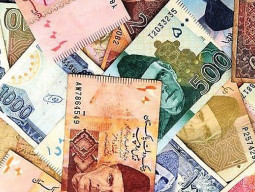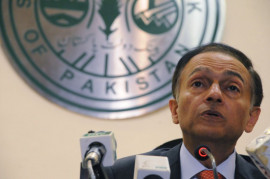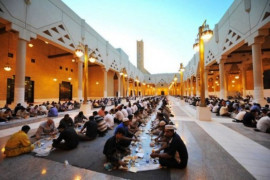
KARACHI:
For quite some time analysts and businessmen have been pressing the government to introduce schemes and incentives, which could help channel home remittances towards productive investment avenues.
But industry officials say that most of the money sent home by overseas Pakistanis is being consumed by daily expenditure and whatever little is saved goes to buying real estate.
“Average size of a single remittance is between Rs50,000 and Rs60,000,” said Farooq Ahmed Soomro, SVP Home Remittances Marketing and Development Wing of National Bank of Pakistan (NBP). “Almost 90% of the families receiving money fall in this category.”
Around 5.9 million Pakistanis working abroad are sending home in excess of $12.7 billion, which has become a mainstay of the country’s balance of payments. However, there are no substantial studies available that explain the consumption pattern of remittances.
“It would be wishful thinking on our part to assume this cash can somehow be diverted for investment in capital goods in a big way,” said Soomro, who is part of an NBP team which handles 10% of all the remittances coming to Pakistan.
A general fear of taxes and mistrust of politicians has also discouraged expatriate Pakistanis from documenting the transactions, he said. “This means we at banks can’t offer them too many schemes. For an investment scheme to work, we also want to know how secure an expatriate job is. All these things make this complicated.”
Soomro believes that expatriates invest in property once in few years. “That is when he sends money to his brother or wife to buy a house or renovate it.”
At the government level, just a few schemes have been introduced over the years to stimulate investment from expatriates and almost all of them were executed by the Overseas Pakistanis Foundation (OPF) in the real estate sector.
The OPF has 85,000 overseas Pakistanis on its record who account for roughly $1 billion in remittances. These are the people who disclose their home remittances.
“Just 2,000 of them hold our Platinum cards, which means they remit $50,000 or more every year,” said Mustafa Haider, Deputy Director of OPF. “Most of the people send home between $2,500 and $5,000 annually. They have Silver cards and number around 36,000.”
Expatriates who send between $25,000 and $50,000 and have Gold Plus cards are 3,500, Gold card holders who remit $10,000 to $25,000 are 33,000 and Silver Plus category including those sending $5,000 to $10,000 are 10,000.
“The cards offer them small incentives like they can bring in television sets and enjoy easier clearance at Pakistani airports,” Haider said. “One reason many are hesitant about sharing remittance details is probably that some of them are illegal residents.”
Bitter past experiences also discourage overseas Pakistanis from holding investments at home like seizure of foreign currency accounts after 1998 nuclear tests, he said.
Exchange Companies Association of Pakistan President Malik Bostan also concurs that average size of a remittance transaction remains small between $500 and $1,000 a month.
“Yes, some of the money is being spent in real estate. If you talk about our exchange company (Pakistan Exchange) then most of the money goes to Gujrat, Jhelum and Gujranwala. Many shopping plazas and flats have been built in these cities from this money,” he said.
The government would need to earn the trust of overseas Pakistanis if it wants to use remittances for its own investment requirement, he said. “People have a bad past experience as no one has tried to keep check on fake housing and ponzi schemes, which surface from time to time.”
Nevertheless, a boom in the stock exchange and real estate markets haven’t missed the attention of expatriates.
Shafi Jakvani, who heads Citi Associates, a property consultancy, says if he handled 1,200 transactions in the past year then at least 10% were related to expatriates directly buying property here.
“Unfortunately, we don’t have a database but if only the record of DHA’s Phase 9 development is analysed, we will find many NICOP (National Identity Cards for Overseas Pakistanis) holding buyers who have bought the plots,” he said.
Published in The Express Tribune, July 10th, 2013.
Like Business on Facebook, follow @TribuneBiz on Twitter to stay informed and join in the conversation.
COMMENTS (1)
Comments are moderated and generally will be posted if they are on-topic and not abusive.
For more information, please see our Comments FAQ























































Looks like it is time to rip off overseas Pakistanis.